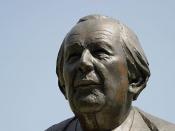AbstractThe concept of maturation presented by Arnold Gesell is central to developmental psychology. He said that childÃÂs growth or development is influenced by the environment and the action of the genes. He also indicated that the childÃÂs development occurred in a fixed order through a series of stages. He opposed any instructional efforts on placing a child ahead of ÃÂscheduleÃÂ; when the time is right, the child will simply begin to master the task through his/her own inner urges. Two major criticisms to his concept are also presented in this paper.
GesellÃÂs Concept of MaturationIntroductionPioneered by the American psychologist Arnold Gesell (1880-1961), the concept of maturation, which is central to developmental psychology, stresses the role of nature in human development (Gale Group, 2001.)The purpose of this paper is to take a look at the major concepts of GesellÃÂs concept of maturation and to present and discuss two criticisms of his concepts.
GesellÃÂs Concept of MaturationGesell said that the childÃÂs growth or development is influenced by two major forces: The environment and the action of the genes. Gesell called this process maturation (Crain, 2005).
He observed that a childÃÂs development occurred in a fixed order through a series of stages. This is an outstanding feature in maturational development. (Gale Group, 2001).
By observing how an embryo adhered to a specific order in its own development, Gesell proposed that a child post natal neuromotor development also followed a strict specific order (Crain, 2005).
His concept of maturation allowed him to see that just like a baby learns to run by first sitting, then standing, then walking, the principles of maturation also have a ÃÂrateÃÂ of development that is controlled by internal genetic mechanisms (Crain, 2005). And the forces of socialization that are so important in the growing and...


